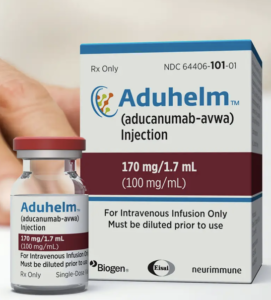
In its final decision about anti-amyloid monoclonal antibodies for Alzheimer’s disease, CMS upheld its proposed plan to cover aducanumab (Aduhelm) only for people in randomized controlled trials.
ALZHEIMER’S ASSOCIATION: On April 7 2022, the Centers for Medicare & Medicaid Services (CMS) released its final decision on coverage for a new class of drugs addressing the underlying biology of Alzheimer’s disease. We are deeply disappointed with the immediate impact this decision will have on Americans living with Alzheimer’s and their families. Our full statement on the CMS decision is here.
As you may recall, the first of these treatments — aducanumab or Aduhuelm — was approved by the U.S. Food and Drug Administration (FDA) last June under the Accelerated Approval Pathway. At no time in history has CMS imposed such drastic barriers to access FDA-approved treatments for people facing a fatal disease.
We believe that people with Alzheimer’s should have FDA-approved treatments covered by Medicare just as those facing other diseases do. Each individual who could benefit, in your family and in every family, deserves the opportunity to choose such treatment in consultation with that individual’s doctor.
Still, some of the recommendations provided by people living with Alzheimer’s and the Alzheimer’s Association have been incorporated into the CMS decision. CMS has decided to utilize a registry for future treatments granted full FDA approval. We know that the recently announced Alzheimer’s Association registry will play an important role in collecting and analyzing real-world data. Similar registries have been successful in heart disease and cancer.
Our work is far from done. The Alzheimer’s Association is here for you and your family today and every day to provide care and support through our programs, resources and 24/7 helpline. Our constituents remain at the center of everything we do and we will continue to work relentlessly to ensure equitable access to quality care including all current and future FDA-approved treatments and diagnostic tests needed for all individuals with Alzheimer’s disease.”
Others saw the CMS decision as the best choice for people with Alzheimer’s at this time. “It restores one’s faith in regulators and government doing the right thing for the most people,” Lon Schneider, MD, of the University of Southern California in Los Angeles, told MedPage Today.
“The FDA fumbled it,” Schneider observed. “CMS saw what most of us saw — the lack of evidence for substantial efficacy and safety when aducanumab is given to early Alzheimer’s patients every month for 18 months — and therefore, found aducanumab not to be ‘reasonable and necessary’ treatment that should be covered by Medicare.”
The restrictions outlined in the CMS determination, including the distinction between accelerated approval and traditional approval, have never been applied to drugs for other diseases, aducanumab maker Biogen said in a statement released late Thursday.
“Biogen is carefully considering its options and will provide updates as the company further evaluates the business impact of this decision,” the statement read.